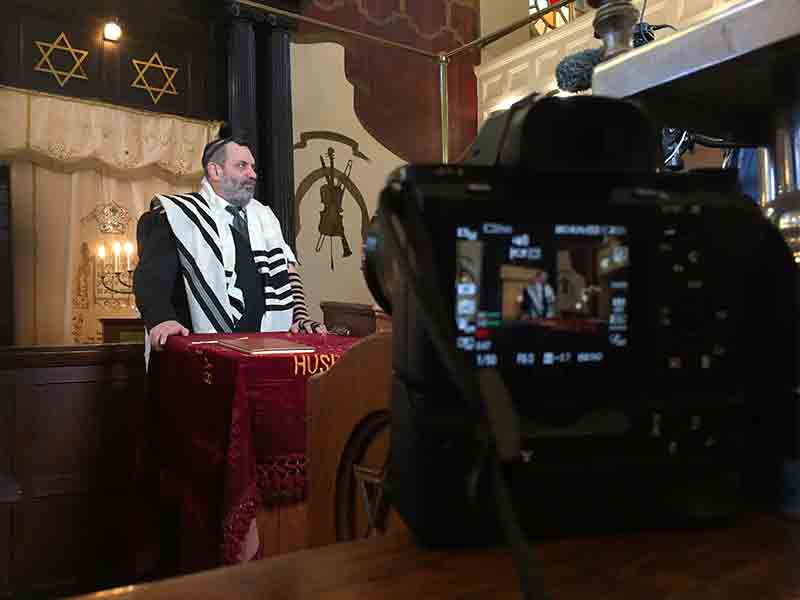Toronto-based filmmakers Igal Hecht and Aaron Daniel Mandel are back with a second season of their documentary series House of God, which will focus on various houses of worship and religions within the Greater Toronto Area (GTA).
The show is set to be released on Bell’s video on demand service on Sept.5, with all eight, 30-minute episodes available for streaming.
While the first season focused on Christianity in Latin America, showcasing 65 churches throughout countries like Panama, Colombia and Argentina, season two, directed and produced by Hecht and Mandel, explores religious diversity within the GTA. It features 16 houses of worship from six different faiths, including Christianity, Judaism and Islam.
“This show gives (viewers) the opportunity to take a peek inside the buildings and see what worship is like within these places… and realize that there are a lot of common bonds and similarities between all of them. I think that was really important for people to see,” said Mandel.
Another motivation behind the show, according to Mandel, was to paint a positive picture of various religious groups and show the impact these places of worship have on the communities they serve.
READ: THE ANTI-ISRAEL LEFT’S CAMPUS STRONGHOLD IS NO SURPRISE
“We also wanted to incorporate the multiculturalism and diversity that exists in Toronto into the program and introduce everybody to everyone else. There are misconceptions between religions of one another, so this was a perfect opportunity to introduce Canadians to each other,” said Hecht.
On the Jewish side, House of God represents Judaism’s three main denominations, and showcases Chabad Romano, Holy Blossom, Anshei Minsk and Beth Tzedek.
“We wanted to include very historical and significant synagogues to the city, and we wanted different denominations within Judaism, because we think it’s important for people outside of Judaism to have an understanding that there are these Jewish denominations,” said Mandel.
The Jewish episode focuses on the main streams of Judaism and allows viewers to learn about Jewish tradition, as well as the history of the Jewish community in the GTA. The episode highlights the various differences and similarities between the three main denominations and talks about the history behind each of the synagogues that are mentioned.
“You also learn about aspects of Judaism. What the importance of tfillin is, for example. We learned a lot while we were making this and for our own community, I think it’s a great celebration of the Jewish community, as well as other communities,” said Hecht.
Hecht and Mandel aim to show how similar and connected each of the featured religions are, which Hecht believes is important to celebrate in a world that is becoming more religiously divided.
“With all the hatred that’s happening in the world, people really use religion as a divisive tool to preach hatred, and if you actually bother to look into these places of worship like we did, and the show allows you to do so, you realize just how similar we all are in so many ways,” explained Hecht.
Hecht said that despite having different holidays, the aspect of families and communities coming together and celebrating is something that is a common denominator in all of the houses of worship that they covered in the season.
Another interesting similarity between many of the houses of worship in the GTA was that, according to Mandel, many of these religious institutions were being run by “strong women.”
“Whether it was a synagogue, a mosque, a Hindu temple, a church, generally our point of contacts within these organizations were strong, young women who did an amazing job helping us produce this show, dealing with the logistics, scheduling, giving us access and also advising us on what days to come in and shoot. It was a very pleasant surprise because of what you hear in the media sometimes,” said Mandel.
The show does not, however, compare any of the religions that are mentioned, and the point of the show is to educate people about various faiths that are in their community, as well as allow viewers to gain a better understanding of the different religions. Hecht and Mandel said that each place of worship has its own segment, which allows the audience to learn about the historical significance of it, as well as learn about the faith itself.
“We all live in this city and I think we need to better understand each other and learn about each other, as opposed to just assuming things,” said Hecht.
“This show really helps you understand various points of view of a religion. I think that’s (a) really strong point to make and something that the show really pushes forward – just getting to know one another. And that’s very important – in our own Jewish community and beyond.”
